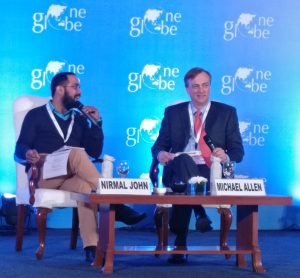A blog post by Puru Trivedi, Director of Corporate Relations, Meridian International Center
On February 9, 2018, I traveled to India to speak at the 8th Annual One Globe Forum, which gathered experts to discuss the transformation of India into a 21st century knowledge economy. Meridian International Center was a strategic partner to the One Globe Forum in 2018, providing thought leadership from the U.S. perspective.
The United States and India share many similarities and superlatives; one is the oldest democracy, the other is the largest democracy. Both countries won their independence from the United Kingdom, and both countries have an open press and a free judiciary. While U.S.-India relations are at an all-time high, the Trump Administration’s pivot to describing the region as ‘the Indo-Pacific’ is guaranteed to drive future American foreign policy in the region. The One Globe Forum unpacked the current state of this important bilateral relationship.
Keynote speaker Smt. Harsimrat Badal, India’s Minister for Food Processing Industries, captivated the audience with her message of women’s empowerment and inclusive growth. A gathering of generals from Nepal, Bangladesh, and Sri Lanka discussed the importance of joint-cooperation in military and defense issues. I focused on the burgeoning U.S.-India relationship, a partnership which stands to define the 21st century – as no two countries are more poised to be a positive influence in Asia than the United States and India.

Another highlight of the program was Mr. Michael Allen, Managing Director of Beacon Global Strategies, and his remarks on the current state of affairs in the U.S. government. This all-encompassing discussion highlighted the ways in which the Russians interfered in the United States election, and what the U.S. government and companies can learn to protect themselves from cyber liability. Beacon Global Strategies, a member of the Meridian Corporate Council, works with premier defense equipment manufacturers, advising on political risk and other areas of opportunities for companies seeking to enter new markets.
A theme across the forum was China’s growing influence in the Indo-Pacific region. Chinese projects in India’s neighboring countries of Pakistan, Myanmar, Nepal and Sri Lanka are perceived to encroach upon shared economic interests and cultural values in the region. Specifically, China’s Belt and Road Initiative, the formation of the Asian Infrastructure Development Bank, and the abolishment of terms limits for heads of state, all show one thing: China seeks to fill the role once occupied by the United States in Asia, and America’s soft power initiatives in the South Asian region are needed now more than ever.
At the conclusion of my trip, I met with an old friend, one of the most important members of the Prime Minister’s team, Mr. Bharat Lal, who currently serves as the Joint Secretary to the President of India. Mr. Lal is a big believer and strong proponent of public diplomacy, and we exchanged ideas regarding ways to cultivate and foster the leadership potential of many up-and-coming Indian politicians and bureaucrats. Both the Indian system and the American system can learn from each other, and with more exchanges to each country, the next generation of leaders in India can develop a new vision for India the country.
Meridian International Center seeks to create innovative exchange, education, cultural and policy programs that advance three goals: strengthen U.S. engagement with the world through exchange, prepare public and private sector leaders for a complex future, and provide a neutral forum for international collaboration across sectors. The Meridian Corporate Council, a platform that connects the private sector to the diplomatic community and U.S. government, continues to be the pre-eminent platform for commercial diplomacy in Washington DC and looks forward to working with India and partners in South Asia to ensure a more peaceful and more prosperous future.















